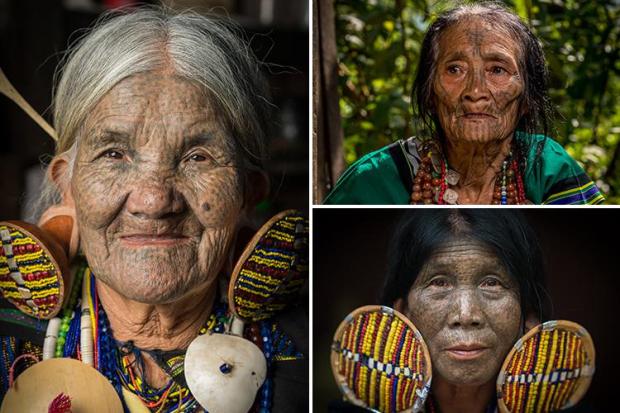Inside the remote Burmese tribe where women completely tattoo their faces to ‘make them less attractive to kidnappers’
Extraordinary photographs show girls’ faces inked with intricate designs when they are just 12

IN the mountains of Myanmar lives a tribe where the women have taken a unique approach to their beauty regime - by decorating their faces with tattoos.
The Chin people in the remote mountain town of Mindat, have been marking women in the area with intricate face tattoos for centuries.
With a variety of styles and designs the detailed markings have a deep rooted cultural significance to the largely Christian community.
Photographer and cyber security expert, Teh Han Lin took the intimate pictures on a recent trip to Myanmar.
He said: “When I planned to visit Myanmar (formerly Burma) I was researching about tribes there and I found out about the Chin tribe.”
There have been numerous theories into the origin of the face tattoos and why it only applies to women.
One of the most widely accepted reasons behind the face tattoos is that it was done to make the women look unattractive, thus preventing them from being kidnapped or forced to become a concubine during the time of the Burmese king.
Since then the tradition has taken a life of its own and is regarded as an important cultural practice among the Chin people.
Up until the 1960's girls born into the varying Chin tribes which are the Munn, Dai and Mkang were expected to get their faces tattooed between the ages of 12 and 14.
The practice of face tattoos began to die out as a result of the Myanmar government stamping out the age old tradition as they believed it to be barbaric.
Teh Han said: “There were mixed feelings towards the ban, some were welcoming of the ban and some were against it. For those who were against it they were still practising the face tattoos.”
Now in the remote town only the elderly women have the traditional tattoos, as the custom is increasingly seen as outdated by the younger generations.
Both the Mkang and Dai have similar designs for the tattoos, which includes squares filled in with tiny dots, the women from the Dai sub-group tend to go for a dark blue whereas Mkang women go for a more blue-green colour.
“The Munn’s tattoo style involves straight lines from the forehead to neck with circles between the straight lines and small dots on the forehead and chin. The colour is lighter and mainly black,” Teh Han added.
During his time spent with the tribe they shared the secret behind how they managed to make such intricate designs with very crude instruments.
He said: “The tattoos are done using thorns with a mixture of ox bile, plants and animal fat. The process is extremely painful, especially the tender eyelid area and it normally takes one day to finish, it can be extended to two days depending on the complexity. The recovery itself may take at least two weeks.”









